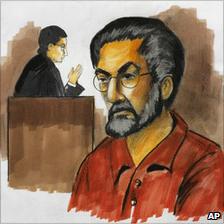David Headley alleges Pakistan role in Mumbai attacks
- Published

Mr Rana, 50, is a Pakistani-born Canadian citizen
A man who scouted sites for the 2008 Mumbai terror attacks has testified in a Chicago trial that the Pakistani intelligence service had links to the group that carried out the attacks.
David Headley was testifying against Tahawwur Rana, a Chicago businessman accused of helping plan the attacks.
Mr Rana is accused of providing Headley with a cover to scout attack locations.
Mr Rana has pleaded not guilty. His lawyers say he was tricked by Headley, a former friend.
More than 160 people were killed in November 2008 when a group of 10 men stormed a train station, hotels and cafes and a Jewish centre, shooting and throwing bombs.
At the opening on Monday of Mr Rana's trial, Headley testified that Pakistan's Inter-Services Intelligence agency (ISI) and militant group Lashkar-e-Taiba (LeT) coordinated with each other.
The ISI provided military and moral support to the group, he said.
He said a Pakistani agent paid him $25,000 (£15,500) for the operation. Headley has separately said he was trained by LeT.
Pakistan believes Headley is an unreliable witness and analysts expect Islamabad to flatly deny alleged links between militant groups and the Pakistani secret intelligence service.
'Friends with a terrorist'
Mr Rana denies the 12 charges that have been levelled against him.
His lawyers say he was tricked by Headley, a longtime friend from their days at a Pakistani military school. Mr Rana was arrested in 2009, and if convicted, he faces a life sentence.
"David Headley... has been manipulating people for years. Dr Rana is by far and away not the first," Mr Rana's lawyer Charles Swift said in his opening statement.
Prosecutors say that in 2006 Mr Rana allowed Headley to open an office of his Chicago-based immigration services firm in Mumbai, which Headley then used as cover to scout sites for the 2008 attack.
"The defendant knew all too well that when Headley travels to a foreign country, people may die," assistant US Attorney Sarah Streicker told jurors on Monday.
"The defendant didn't carry a gun or throw a grenade. In a complicated and sophisticated plot, not every player carries a weapon. People like the defendant who provide support are just as critical to the success."
In November 2008, the 10 gunmen attacked the Taj Mahal and Oberoi hotels, a Jewish centre and a major train station, each of which Headley had scouted in advance.
In March 2010, Headley, a US citizen who spent much of his childhood in Pakistan, pleaded guilty to taking photographs and video of the targets. He could face up to life in prison and a $3m (£1.86m) fine.
In addition, prosecutors say Headley and Mr Rana plotted an attack, which was never carried out, on Danish newspaper Jyllands-Posten, in revenge for its printing of cartoons featuring images of the Prophet Muhammad.
Also charged with planning the Mumbai attack are four Pakistanis, including one said by prosecutors to be a Pakistani intelligence officer. None are in US custody.
- Published17 January 2013
- Published26 April 2011
- Published11 June 2010